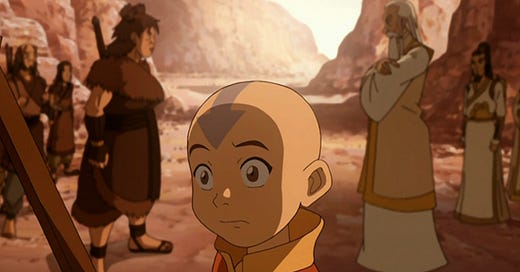Thanks for tuning in to my eleventh of 61 daily reviews of Avatar: The Last Airbender! Yesterday, we watched S1E10: Jet.
In a way, The Great Divide expands on the message of the previous episode. In that review, I discussed how Jet’s drive for revenge renders him stuck in the past, but Avatar has always been more interested in charting a course for the future. In this episode, the feuding Zhang and Gan Jin tribes live even more explicitly in the past. They’re defined by a hundred-year-old feud, based on an apocryphal story about a quarrel between their two ancestors.
The Zhang are grubby and relaxed, while the Gan Jin are neat and uptight. But fundamentally, they both respect strength and they both want to secure the safety of their people. Avatar wants us to focus on their similarities and shared goals, not their trivial differences. In the end, Aang helps them put their conflict aside when he invents a goofy story about how their two feuding patriarchs were actually just tweenage brothers playing a game. The message is that, more than a hundred years after the original incident, the feud is as silly and meaningless as a children’s game.
It’s also a premise that gives Aang some room to fail and grow into his role as a peace-maker. While many fans really dislike that Aang solves the issue by lying, I don’t think it’s massively out of character for him or a compromise of his morals. I’ve already argued that the show isn’t especially concerned with the sort of backward-looking justice that would demand a more honest end to the feud. It’s both a clarification and a reversal of Episode 10. In this case, the ends (preventing violence) do justify the (non-violent, but dishonest) means, whereas in the last episode the (violent) ends did not justify the (violent) means.
All that being said, The Great Divide is ultimately forgettable and falls flat in its execution and details. The canyon guide is a mostly boring character whose comedic beats are bafflingly unfunny. The setup with the two feuding tribes feels like a stale trope and there’s too much let’s-all-just-get-along morality. The dangers (entering the canyon on foot, the guide’s broken arms) feel contrived. Katara and Sokka behave like caricatures instead of characters and uncritically accept the respective tribes’ stories. And while I don’t have an issue with Aang lying, the story itself is corny and it doesn’t really make any sense that the feuding tribes believe it. Basically, the writers commit the cardinal sin of being unsubtle. I don’t need to dogpile further on an episode that already gets a ton of hate, but you get the point.
The episode certainly has a few good details, too. The canyon crawlers are pretty frightening beasts, at least until they get seriously nerfed by their singleminded quest for food. And the two animation styles representing the two sides of the legend, which then converge to the show’s standard style with Aang’s story, is kind of a clever conceit (I’m not sure if it’s a common trope). But it’s still a low point for the series and we’re happy to move on to richer pastures.
See you tomorrow for Episode 12: The Storm! Share your own thoughts on this episode in the comments.
Spare observations
The canyon guide’s broken arms might be the only confirmed time of anyone breaks a bone in the entire series. It feels lazy in light of Avatar’s typical rules about how much impact benders can withstand.
People seem to live relatively long in Avatar. If the feud only started one hundred years ago, you’d think the Gan Jin elders would be at most one generation removed from the story…
The canyon guide does have one good bit of wisdom. “Lonely, isn't it, being impartial?”
Friends of the White Lotus [SPOILERS]
This is the first true filler episode that doesn’t affect future events in any way.
This is our first encounter with refugees traveling to Ba Sing Se. The populous Earth Kingdom capital is a natural shelter, and we’ll meet many more of these folks in Season 2.





